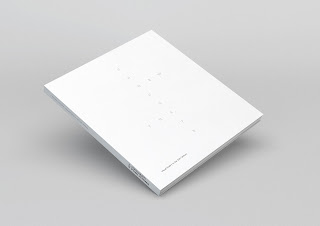'dark islands' by tom chivers
 |
| Dark Islands |
Dark Islands is unlike any other poetry collection you'll pick up this year. It is printed in white text on black paper and has a City Lights compactness. Hold it in your hands and the unmistakeable waft of quality paper rises to the senses.
In the opening front matter the phrase Dark Islands press into the name Tom Chivers, verso to recto: both coupled words have the same amount of syllables and metrical cadence. They press like a lock opening the book. It is at this point that we realise how closely the contents of this book – the brilliant poems that make up Chivers' second collection – and the conception of the book are integrated. Like modern London towering over the rubble of earlier civilisations, this book has been made from the inside out. The poems cut shard-like, reflecting – and refracting – the flotsam and printed verbiage that appears, like dried-out sea flowers, on London's shore each day.
The poems are listed on the contents page with Roman numerals instead of numbers. Throughout Dark Islands Chivers steers the reader through an eery time-freeze that suggests both past and future: we are as much on the shores of the first Roman docks as in an apocalyptic landscape.This recalls the opening of Conrad's Heart of Darkness, often cited as the first modernist novel – published in 1899 – which begins by looking from the shore near Gravesend back towards the same dark island of Chivers' title. I've always loved the saturated weight of Conrad's prose in the opening of this novel, as if forged from iron scavenged from the river bed and foisted into a new cast that can't quite join together the unsettling hinges of place and story that we are entering into:
A haze rested on the low shores that ran out to sea in vanishing flatness. The air was dark above Gravesend, and farther back still seemed condensed into a mournful gloom, brooding motionless over the biggest, and the greatest, town on earth.
Chivers' handling of London fits into this Conradian tradition, which isn't - like so much 'London poetry' - the jangling music box of wonderment in well-cut verse. This is London as the mudlarker's reality, the collecting and assembling of past devices, symbols and matter which is then organised with jeweller's attentiveness. Words and objects are the almanac indicating the future direction of the city and our relationship with it.
The book begins with two epigraphs which also provide an unexpected symmetry: the two 'J's, Donne and Ballard, are twinned. No man is an island but then modern man is islanded in a city made of Ballardian concrete. This suggests a further hinge of modern London that Chivers isn't afraid to attempt to stabilise, if fleetingly – like the parallax of a viaduct wingmirror – which is that between the spiritual and the environmental. We can't come to terms with our modern selves without considering the impact the city as environment has on that self. Obvious, but largely unexplored in contemporary poetry; this is Chivers' milieu:
From the house, from the spring-line, from the sugar cane factory
we watched the breaking of colour on a false horizon.
As if that fizzing ring might hold back ocean.
(from 'Island of Coral')
Contemporary poetry is too full of poets trying to make modern by referencing iPhones, Skype and social media leading to poems which, at best, twinkle with a garish finish. Addendums to teeth-whitenting formulas. Chivers' force in this collection is showing - no ideas but in things - that we only understand where we are, and where we're heading, through a deep and vigorous sense of what's come before. This doesn't simply mean the history of London as reading matter; it means going to touch the walls where the layers of remaining historical sites meet or watching a hidden river silently pour itself into the thriving Thames. In this sense, Chivers' poems work in forensics, clawing back the pieces that help us make sense of the whole: they are not broken jetsam but carefully honed fractals.
It is also worth remembering that Marlow, the person telling the broken 'story' of Heart of Darkness, is addressing a lawyer, an accountant and a Director of Companies. All professionals of rigid outlooks and controlled languages who often warp the idea of 'progress' to suit their worldviews. Chivers has this same Marlow-esque cynicism towards bandied language. Contemporary techspeak figures prominently in Dark Islands which Chivers pins into the larger historical collage, aware that the 'modern' has been here before and that there'll be new buzzwords tomorrow:
Everything is swipeable. The spire daggers skywards.
(from 'Funeral Ikos in Clifton Cathedral')
Test Centre are to be praised for taking the rich material of Chivers' poems and giving the publication a feel of classic past print, a future collectible. White text on black: the poem at the fore of the city apocalypse that smoulders behind. The poem as the only map: light in blackout.
Dark Islands is available to buy from Test Centre here



Comments